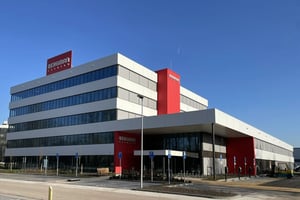The annual turnover of the international animal genetics market runs into many hundreds of millions every year and acquisitions are the order of the day. Yet the financial media generally pay little attention to the developments taking place in this innovative niche of agribusiness. Thijs Hendrix, president of the Dutch family-controlled company Hendrix Genetics, sheds light on some of the emerging trends in a sector that forms the basis of food security for billions of consumers.
Thijs Hendrix (1955) is a farmer and entrepreneur, as his father Harry (1926-2010) and his grandfather Thijs (1884-1954). The words he uses on his Twitter account are telling. He describes himself as a farmer’s son, an entrepreneur and the custodian of a heritage that stretches back more than a century.
Yet Hendrix’ grandfather would probably recognise little of his original farming enterprise in the Hendrix Genetics of today. In the last few decades the company has become a leading international player in the field of animal species used for commercial breeding purposes. It now operates in more than 100 countries and employs over 2,500 people worldwide. The company’s areas of expertise include laying hens and eggs, turkey breeding, pig breeding and aquaculture. Supporting activities, such as the development of breeding software, also make a sizeable contribution to annual revenues of €340 million (2014).
Hendrix Genetics is led by a management committee, with the two co-founders, Hendrix himself and CEO Antoon van den Berg, both playing a key role. The majority of the shares are owned by the Hendrix family, so the company is still family controlled. Its first external investor, the French industrial group Sofiprotéol, a subsidiary of the Avril Group owned and managed by a cooperative of 150,000 farming members, was brought on board in 2008. NPM Capital became its second external shareholder earlier this year.
Forward integration
Thanks to NPM Capital, Hendrix Genetics will be able to accelerate the execution of the long-term strategy outlined in its Vision 2020 plan, says Hendrix. This acceleration is welcome in a sector characterised by forward integration worldwide. Two years ago the company incorporated the largest turkey distributor in Europe and is investing heavily in distribution the distribution of laying hens in the US, with the acquisition of two existing distributors and the construction of a new facility.
Hendrix: “We pulled out all the stops and the results have exceeded our expectations. The margins might not be as big on the distribution side, but they are more stable. The structure of the sector has improved considerably and better coordination between the North-American, Polish and French markets is enabling increased efficiency. All of this is clearly paying off.”
It turns out that forward integration has other advantages. More direct contact with the end customer – the farmers who rear the livestock for slaughter – gives the company a clearer understanding of areas that offer scope for further product improvement. Forward integration also allows Hendrix to control factors that affect quality (such as temperature and feed) one step further along the value chain, which can also have a positive effect on margins.
Growing demand for animal protein
There’s no doubt about it. The commercial prospects in the animal genetics industry are promising. The world’s second largest market research firm, MarketsandMarkets, anticipates that, five years from now, the global market for breeding stock and related services will be worth an estimated $20 billion. The factors driving this development are growth of the world population, especially the expanding middle classes, and the increasing demand for animal protein.
The company's business activities also add value to the supply chain, as Hendrix explains. “Breakthroughs in animal genetics are not patentable outside of the seed sector for example. This means that we always have to stay one step ahead. We have to keep producing new offspring that are more efficient than the previous generation. In doing so, we are constantly contributing to value creation in the chain.”
_jpg-1.webp?width=2000&height=2000&name=HG-Layers2%20(2)_jpg-1.webp)


.jpg?width=448&height=200&name=cybersecurity-privacy-protect-data%20(1).jpg)









